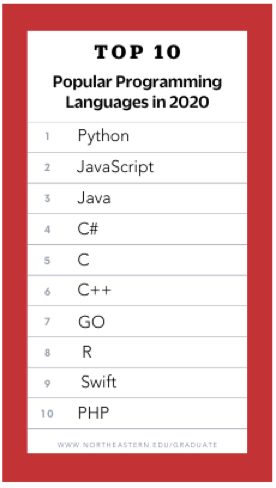Programmers in times of digitalization are increasingly important in almost every area of business and life. Whether we talk about healthcare, science, or education developers nowadays are needed everywhere.
It is a skill that offers you an enormous amount of career flexibility and freedom, while at the same time not necessarily requiring a degree. Once you know the fundamentals of programming you can specialize in a great variety of different fields. And the best thing about it? All you need to start your programming journey is a computer, internet access and your mind.
With what language should I start to code?
There are hundreds of programming languages and technologies used for different areas of information technology. For example:
- Web development: HTML, CSS, and JavaScript
- Desktop App Development: C++,C#, …
- Data Science: Python or R
- Mobile App Development: Swift for iOS or Java for Android,…
- Robotics engineer: C,C++, …
- …

You see depending on what you want to use your programming skills for, you will need to learn a lot of different technologies. When people want to start programming, they often already have an idea in which area of IT they would want to work in the future. So, ask yourself:
Why do you want to learn programming?
What area of IT sounds most interesting to me?
Then do some quick research on what languages are recommended for your career path.
Having a general idea of the type of programmer you want to become can be a shortcut to a successful programming career, however, it is not mandatory. There are some languages out there that are really a great choice for any beginner programmer. Python, C#, Java, and JavaScript are all languages that offer you great career flexibility and wide utility.
Learn the fundamentals
After you choose your preferred language, you can start to learn the fundamentals most programming languages use. Here are some amazing free sites that provide coding courses and information to help you learn the basics of programming:
· Coursera
· Sololearn (also has a very good mobile app to practise more)
The fundamentals of most programming languages:
· Variables and data types
· Conditionals
· Loops
· Classes and Objects
· Constructors
· Methods/functions
· Debugging
Practise, practise, practise
Do your coding courses regularly to really get comfortable with the basics. Once you get the basics you will be able to write your own little programs and applications and start realizing your own project ideas.
Also, it is important that you do not try to learn all languages and all their libraries, frameworks and extensions at once. Instead, you should really focus 100% on learning the one language you chose before. After learning one language it will be a lot easier for you to learn another language. That is because the hardest part of programming is not actually learning the language but learning how to solve problems on your own. Once you understand how to break down complex problems into blocks of code, you can easily learn any language.
Learning multiple languages at once vs. focusing on one language:
The programmer’s toolbox
No programmer knows every language, every error, and every technology. A lot of times used technologies will also vary from project to project, so you will end up learning a completely new language or technology for a new client. In that kind of situation, you will have to know how to acquire the necessary knowledge on your own. Here is a list of tools that almost every programmer uses to solve their problems and learn new stuff fast:
· stackoverflow.com → This site is a forum for programming problems and errors, where people post their problems, and the community will help them find a solution. When you google your error messages you will likely end up on stackoverflow.
· github.com → Once you start working with a team of developers you will use GitHub or a similar platform to work together and collaborate on the project’s source code. On GitHub, you will also be able to find other reported issues for specific technologies and their possible solutions.
· Documentation → Every programming language and every technology has a documentation. A documentation is essentially a handbook on how to use the technology and what it does.
· YouTube tutorials → A great way to learn and easier for beginners, than learning directly from documentations.
As a beginner programmer you might end up copying a lot of code from StackOverflow and GitHub and that’s ok. But please also try to understand the code, otherwise, you will not learn anything from it 🙂 Also, people on StackOverflow are very strict about rules and it can be quite harsh for newbies, I recommend you take a look at Stackoverflow Guide
Conclusion
If you take away anything from this article it should be that when learning to code, the most important skill is actually a soft skill – the ability to teach yourself. As technologies change fast, a good programmer is constantly aware about the newest tech, always ready and eager to learn new languages and explore new technologies 🤓.
#daretolearn
Free to reach out to Ben if you have any more questions about programming or would like to know more about a coding related topic 😊 Connect with him on LinkedIn.



